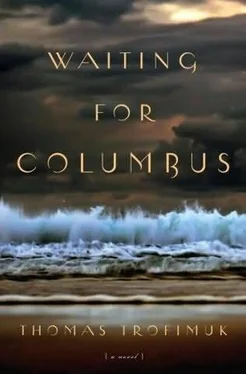“Good morning, my ass,” he mumbles.
Elena, a tall blond woman with slender fingers, who does not speak, is sitting across from Columbus. She smiles. Columbus has never seen, or heard, Elena speak a single word. Nothing in all his time at the institute. He heard from one of the orderlies that there is no physical reason for her muteness. She just stopped speaking. There are days when he can relate.
“Did you just call me an ass?”
Elena smiles again. She places her mug of coffee carefully on the table.
“What in particular is good about this morning? Perhaps it’s good for you because you get to leave. This is your job. You come, you go. This”-he looks around the dining hall and gestures, points with open hands-“this, is my life. No leaving. You get to go out into the world and have a glass of wine, make love, sleep until noon if you want. I am not free. I am completely surrounded by crazy people.” He looks across the table at Elena. “I don’t think you’re crazy, by the way.”
Elena nods her understanding and appreciation.
“It is not a good morning, Nurse Consuela. It won’t be a good morning until I am waking up with a beautiful woman. A woman with curves like waves. A woman whom I love. A woman who will drink wine with me and drift inside a dream about the other side of the ocean. So fuck off with your cheery greetings.”
Consuela stands up. The thing is, she was trying not to be too cheery. She is aware that this is an institution.
“Sit,” he says. “I’m grumpy. I’m sorry.”
Consuela sits down but she’s bristling, hesitant.
“There was a morning-in my memory-when I was very happy.”
“Oh really. What was her name?” She takes a sip of coffee.
He looks at her with a pitying, downward glance. “I was with my son.”
Well, she thinks, at least my feet are getting clean from sticking them in my mouth so often this morning.
***
Morning does not come quickly when one is looking for it. It becomes a lugubrious, lumbering animal that moves only when it wishes. Yet mornings are inevitable. This one had sifted in through thick clouds on a blanket of fear. Columbus only hopes that they have successfully crossed the border from Portugal into Spain. He and his son, Diego, have been alternating between walking and running all night, and now they arrive inside a thick fog.
I think we’re safe now, Columbus is thinking. I think we’re across the border. We should stop at an inn and ask just to make sure. If I were at sea, I would know exactly where I was. If I could have seen the stars last night, I would have been able to tell when we crossed over.
“Why are we leaving, Papa? Did we do something wrong?” Diego is six years old. He has been quiet most of the night and now, as he begins to get hungry, he also begins to hunger for information.
“No, I said some things to the king and the king didn’t like what I said. That’s all. That’s why we’re leaving.”
A long pause. The boy is tired, has been traveling at a severe adult pace along the dusty roads all night. It’s finally morning. Traveling at night is dangerous-insanity, some would say. Wild animals and desperate, vicious people lurked at the edges of highways at night. These two had little choice and they were lucky. They met no one, heard a rustling in the bushes twice but that was all.
“What did you say to the king, Papa?”
“Some things about taking chances. Some things about taking risks if you ever want to achieve greatness. Some things about guts. And I guess the king took the things I said to heart.”
“Who were those men with swords?”
“They were some of the king’s friends.”
“Did they want to hurt us?”
“They were angry. They wanted a map created by a man named Toscanelli.”
“Did they find it?”
“Actually, they did not find the map they sought. They did find a map, but not the one they were seeking. They couldn’t tell the difference.”
“What was so great about the map?”
“Well, Toscanelli felt we could get to the Indies by sailing west to an island called Antilla, and then beyond to the Indies and Japan. He figured Antilla was a halfway point toward the Indies. Well, he put Antilla on a map, and a little bit more.”
“I’m tired, Papa.”
They come over a rise in the road and see the lights of a small village. Several shops, a stable, and farther down the street, an inn. As they approach the town, Columbus can see several young men leaning against the front wall of the first shop, talking.
“Look, Diego, someone here can tell us where we are. Someone there can tell us if we are yet in Spain.”
Father and son walk inside-side-glance the leaning boys.
“Hello,” a woman says. “How are you today?” She stands behind the counter smiling at them benignly. She has long brown hair pulled back into a ponytail that reaches down the middle of her back to just above her buttocks.
Columbus bows to her. “My lady,” he says, “we have just come from Portuguese territory and I was wondering if in fact we had crossed over into Spain.”
“Huh?”
He then tries the same question in Spanish with the same result. He attempts the question in English, then French, then Portuguese again. She seems to be permanently confused, addled beyond hope.
“Is this Spain?”
“ Spain?”
“Yes, I need to know if this is Spain?”
“ Spain is a good country, yes?” She smiles kindly.
How can this woman not be aware of where she is?
Columbus places his hand on the hilt of his sword. Grips it firmly. Visualizes this woman’s discombobulated head rolling on the clean floor, dumb smile fully intact. But then realizes she may be muddled in her head. This may not be her fault. But then why was she in this position of responsibility?
“Come, Diego, we’re going.”
Diego has picked up a chocolate bar.
“Put that down. It’s bad for you.”
“But, Papa-”
“I said no.”
The boys outside are gone, which makes Columbus twitchy. Where are they? He and Diego move swiftly through what Columbus hopes is the village of Palos. They try to stay in the light, avoid the back alleys. They do not encounter another soul. This, too, worries Columbus. Finally they walk slowly up a long hill to what Columbus hopes is the Franciscan monastery at La Rábida. There is no sign. There were no signs. Nothing that indicated a location. Columbus is beginning to think he’s in a bad dream. Apart from the fact that it looks like every monastery he’s ever seen-stone walls around an enclosed inner courtyard, the thick wooden door-he’s nowhere near certain this actually is a monastery. He is tired beyond tired, paranoid, and scared. He knocks on the door, then turns around to see if anybody has followed. He knocks again. He’s not thinking straight-and the boy cannot be expected to go any farther. Either they are in Spain and safe, or he will beg sanctuary at this monastery.
Father Antonio de Marchena opens the door. By necessity, this is a slow and hesitant movement. The father has a friendly, welcoming face. He is not an old man but is accustomed to being around older men, and so his body language is mismatched to his age: he moves a bit slower than he needs to and squints when he doesn’t really need to squint. His physical health is fine, and his eyes are perfect. One could not say the father is fat, but he is certainly well fed, and there is, of course, a vineyard attached to the monastery.
***
“You what?” Father Antonio says, smiling.
They have been sampling the wine, an amber-colored white with an earthy, nutty flavor, served slightly chilled with cheese and bread on the side. The monks have been producing the Condado Pálido wine for as long as the oldest of them remembers.
Читать дальше











